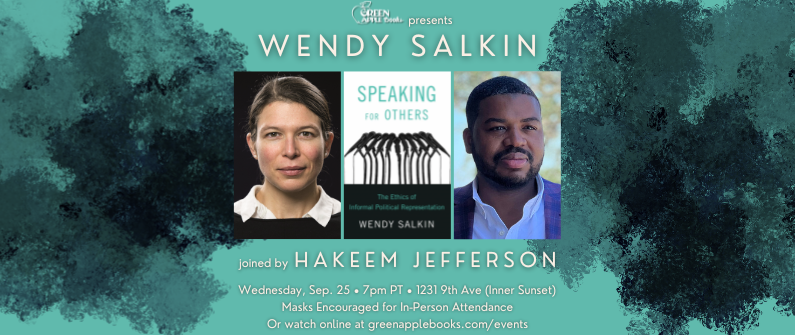Join us on Wednesday, September 25 at 7pm PT when we welcome Wendy Salkin to discuss her book, Speaking for Others: The Ethics of Informal Political Representation, with Hakeem Jefferson at 9th Ave!
Masks Encouraged for In-Person Attendance
Or watch online at the link below:
https://youtube.com/live/DmP0bFCM3ao
Praise for Speaking for Others
"A very impressive achievement. Salkin has opened up exciting new territory for investigation and will have to be cited in all future work about informal political representation."--Elizabeth Anderson, author of Hijacked: How Neoliberalism Turned the Work Ethic against Workers and How Workers Can Take It Back
"When we seek justice, freedom, or equality, we rely on others to speak for us. This original study is about the benefits, dangers, and ethics of informal political representation. The combination of conceptual analysis with cross-disciplinary insight, and the ethical prescriptions it provides, makes it a must-read for political theorists as well as everyone represented by others and representing others."--Derrick Darby, author of A Realistic Blacktopia: Why We Must Unite to Fight
About Speaking for Others
A political philosopher dissects the duties and dilemmas of the unelected spokesperson, from Martin Luther King, Jr., to Greta Thunberg.
Political representation is typically assumed to be the purview of formal institutions and elected officials. But many of the people who represent us are not senators or city councilors--think of Martin Luther King, Jr., or Malala Yousafzai or even a neighbor who speaks up at a school board meeting. Informal political representatives are in fact ubiquitous, often powerful, and some bear enormous responsibility. In Speaking for Others, political philosopher Wendy Salkin develops the first systematic conceptual and moral analysis of informal political representation.
Salkin argues that informal representation can be a political lifeline, particularly for oppressed and marginalized groups that are denied representation in formal political institutions. Yet informal political representatives exert outsized influence over the ways these groups' interests are understood by the public, without the represented having much recourse to hold them accountable. And many informal political representatives are selected not by the groups they represent but by outsiders, sticking these groups with representatives they would not choose but cannot shake. The role of informal political representatives is therefore fraught with moral questions. What exactly are their duties and to whom are they owed? Should they be members of the groups they represent? When is informal representation permissible and when is it best avoided?
Informal political representation is taking place all around us. In fact, you yourself may be an informal political representative without knowing it. Speaking for Others explores the tensions central to this pervasive yet underexamined practice, bringing light to both its perils and its promise.
About Wendy Salkin
Wendy Salkin is Assistant Professor of Philosophy and, by courtesy, of Law at Stanford University.
show less
Masks Encouraged for In-Person Attendance
Or watch online at the link below:
https://youtube.com/live/DmP0bFCM3ao
Praise for Speaking for Others
"A very impressive achievement. Salkin has opened up exciting new territory for investigation and will have to be cited in all future work about informal political representation."--Elizabeth Anderson, author of Hijacked: How Neoliberalism Turned the Work Ethic against Workers and How Workers Can Take It Back
"When we seek justice, freedom, or equality, we rely on others to speak for us. This original study is about the benefits, dangers, and ethics of informal political representation. The combination of conceptual analysis with cross-disciplinary insight, and the ethical prescriptions it provides, makes it a must-read for political theorists as well as everyone represented by others and representing others."--Derrick Darby, author of A Realistic Blacktopia: Why We Must Unite to Fight
About Speaking for Others
A political philosopher dissects the duties and dilemmas of the unelected spokesperson, from Martin Luther King, Jr., to Greta Thunberg.
Political representation is typically assumed to be the purview of formal institutions and elected officials. But many of the people who represent us are not senators or city councilors--think of Martin Luther King, Jr., or Malala Yousafzai or even a neighbor who speaks up at a school board meeting. Informal political representatives are in fact ubiquitous, often powerful, and some bear enormous responsibility. In Speaking for Others, political philosopher Wendy Salkin develops the first systematic conceptual and moral analysis of informal political representation.
Salkin argues that informal representation can be a political lifeline, particularly for oppressed and marginalized groups that are denied representation in formal political institutions. Yet informal political representatives exert outsized influence over the ways these groups' interests are understood by the public, without the represented having much recourse to hold them accountable. And many informal political representatives are selected not by the groups they represent but by outsiders, sticking these groups with representatives they would not choose but cannot shake. The role of informal political representatives is therefore fraught with moral questions. What exactly are their duties and to whom are they owed? Should they be members of the groups they represent? When is informal representation permissible and when is it best avoided?
Informal political representation is taking place all around us. In fact, you yourself may be an informal political representative without knowing it. Speaking for Others explores the tensions central to this pervasive yet underexamined practice, bringing light to both its perils and its promise.
About Wendy Salkin
Wendy Salkin is Assistant Professor of Philosophy and, by courtesy, of Law at Stanford University.
Join us on Wednesday, September 25 at 7pm PT when we welcome Wendy Salkin to discuss her book, Speaking for Others: The Ethics of Informal Political Representation, with Hakeem Jefferson at 9th Ave!
Masks Encouraged for In-Person Attendance
Or watch online at the link below:
https://youtube.com/live/DmP0bFCM3ao
Praise for Speaking for Others
"A very impressive achievement. Salkin has opened up exciting new territory for investigation and will have to be cited in all future work about informal political representation."--Elizabeth Anderson, author of Hijacked: How Neoliberalism Turned the Work Ethic against Workers and How Workers Can Take It Back
"When we seek justice, freedom, or equality, we rely on others to speak for us. This original study is about the benefits, dangers, and ethics of informal political representation. The combination of conceptual analysis with cross-disciplinary insight, and the ethical prescriptions it provides, makes it a must-read for political theorists as well as everyone represented by others and representing others."--Derrick Darby, author of A Realistic Blacktopia: Why We Must Unite to Fight
About Speaking for Others
A political philosopher dissects the duties and dilemmas of the unelected spokesperson, from Martin Luther King, Jr., to Greta Thunberg.
Political representation is typically assumed to be the purview of formal institutions and elected officials. But many of the people who represent us are not senators or city councilors--think of Martin Luther King, Jr., or Malala Yousafzai or even a neighbor who speaks up at a school board meeting. Informal political representatives are in fact ubiquitous, often powerful, and some bear enormous responsibility. In Speaking for Others, political philosopher Wendy Salkin develops the first systematic conceptual and moral analysis of informal political representation.
Salkin argues that informal representation can be a political lifeline, particularly for oppressed and marginalized groups that are denied representation in formal political institutions. Yet informal political representatives exert outsized influence over the ways these groups' interests are understood by the public, without the represented having much recourse to hold them accountable. And many informal political representatives are selected not by the groups they represent but by outsiders, sticking these groups with representatives they would not choose but cannot shake. The role of informal political representatives is therefore fraught with moral questions. What exactly are their duties and to whom are they owed? Should they be members of the groups they represent? When is informal representation permissible and when is it best avoided?
Informal political representation is taking place all around us. In fact, you yourself may be an informal political representative without knowing it. Speaking for Others explores the tensions central to this pervasive yet underexamined practice, bringing light to both its perils and its promise.
About Wendy Salkin
Wendy Salkin is Assistant Professor of Philosophy and, by courtesy, of Law at Stanford University.
read more
Masks Encouraged for In-Person Attendance
Or watch online at the link below:
https://youtube.com/live/DmP0bFCM3ao
Praise for Speaking for Others
"A very impressive achievement. Salkin has opened up exciting new territory for investigation and will have to be cited in all future work about informal political representation."--Elizabeth Anderson, author of Hijacked: How Neoliberalism Turned the Work Ethic against Workers and How Workers Can Take It Back
"When we seek justice, freedom, or equality, we rely on others to speak for us. This original study is about the benefits, dangers, and ethics of informal political representation. The combination of conceptual analysis with cross-disciplinary insight, and the ethical prescriptions it provides, makes it a must-read for political theorists as well as everyone represented by others and representing others."--Derrick Darby, author of A Realistic Blacktopia: Why We Must Unite to Fight
About Speaking for Others
A political philosopher dissects the duties and dilemmas of the unelected spokesperson, from Martin Luther King, Jr., to Greta Thunberg.
Political representation is typically assumed to be the purview of formal institutions and elected officials. But many of the people who represent us are not senators or city councilors--think of Martin Luther King, Jr., or Malala Yousafzai or even a neighbor who speaks up at a school board meeting. Informal political representatives are in fact ubiquitous, often powerful, and some bear enormous responsibility. In Speaking for Others, political philosopher Wendy Salkin develops the first systematic conceptual and moral analysis of informal political representation.
Salkin argues that informal representation can be a political lifeline, particularly for oppressed and marginalized groups that are denied representation in formal political institutions. Yet informal political representatives exert outsized influence over the ways these groups' interests are understood by the public, without the represented having much recourse to hold them accountable. And many informal political representatives are selected not by the groups they represent but by outsiders, sticking these groups with representatives they would not choose but cannot shake. The role of informal political representatives is therefore fraught with moral questions. What exactly are their duties and to whom are they owed? Should they be members of the groups they represent? When is informal representation permissible and when is it best avoided?
Informal political representation is taking place all around us. In fact, you yourself may be an informal political representative without knowing it. Speaking for Others explores the tensions central to this pervasive yet underexamined practice, bringing light to both its perils and its promise.
About Wendy Salkin
Wendy Salkin is Assistant Professor of Philosophy and, by courtesy, of Law at Stanford University.
show less
Date/Times:
1231 9th Avenue, San Francisco, CA 94111
The Best Events
Every Week in Your Inbox
From Our Sponsors
UPCOMING EVENTS
Great suggestion! We'll be in touch.
Event reviewed successfully.









